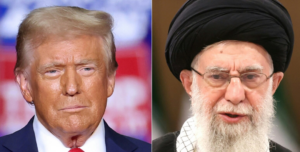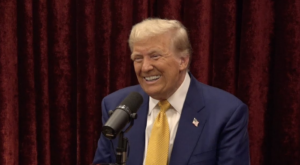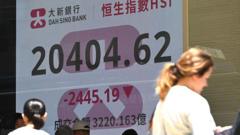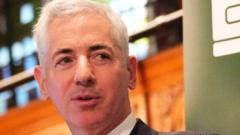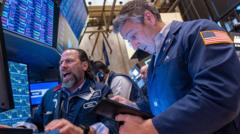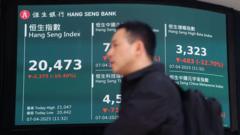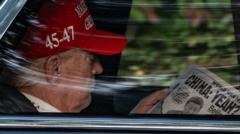As the U.S. stock market faces turbulence, Trump officials assert their commitment to new import tariffs, emphasizing negotiations with over 50 countries to alleviate trade barriers. Protests erupt nationwide against the policies, alarming global leaders.**
Trump Administration Stands Firm on Tariffs Amid Market Turmoil**
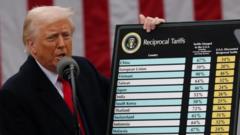
Trump Administration Stands Firm on Tariffs Amid Market Turmoil**
Officials remain resolute about import tariffs despite significant market declines and international backlash.**
In the face of a declining stock market, officials from President Donald Trump's administration have reiterated their steadfast commitment to implementing a series of tariffs on imports. In various television interviews, Treasury Secretary Scott Bessent downplayed recent downturns in the market, while Commerce Secretary Howard Lutnick assured viewers that "tariffs are coming" despite the turbulence. Bessent noted that there was "no reason" to anticipate a recession stemming from the current economic climate, dismissing the turmoil as an "adjustment process."
As the U.S. markets plummeted over 5% across major indices, with the S&P 500 suffering its worst week since 2020, concerns escalated globally. Notably, Saudi Arabia's stock exchange faced nearly a 7% dip, marking its most significant loss since the onset of the pandemic. Lutnick stated on CBS News that the recently enacted 10% "baseline" tariff on all imports would remain in place "for days and weeks," reinforcing the planned introduction of steeper tariffs on about 60 of what the administration labels "worst offenders."
In a bid to showcase progress, Bessent argued that Trump has leveraged this situation to foster negotiations with over 50 countries interested in addressing non-tariff trade barriers and countering currency manipulation. However, the specifics of these negotiations have yet to be revealed. In contrast, leaders from Indonesia and Taiwan expressed their intent not to retaliate, while Vietnam's President To Lam requested a postponement of proposed tariffs on exports to the U.S.
China, meanwhile, announced plans to impose a significant 34% tariff on all U.S. imports, set to take effect soon. UK Prime Minister Sir Keir Starmer expressed his concerns about a transformed global landscape, urging for discussions that could avert trade hostilities. Following talks with Canadian PM Mark Carney, both leaders recognized the risks of an all-inclusive trade war.
In Washington, Israeli Prime Minister Benjamin Netanyahu is scheduled to meet Trump shortly to discuss trade relations, highlighting their longstanding connection amidst the evolving situation. Simultaneously, the nation witnessed widespread anti-Trump protests, reflecting public dissent toward the tariffs and broader issues under the Trump administration. With demonstrators gathering in major cities, the intensity of the backlash raises questions about how the financial markets will respond as they open next week. As the administration urges Americans to remain steadfast, the future implications of these tariffs continue to unfold.
As the U.S. markets plummeted over 5% across major indices, with the S&P 500 suffering its worst week since 2020, concerns escalated globally. Notably, Saudi Arabia's stock exchange faced nearly a 7% dip, marking its most significant loss since the onset of the pandemic. Lutnick stated on CBS News that the recently enacted 10% "baseline" tariff on all imports would remain in place "for days and weeks," reinforcing the planned introduction of steeper tariffs on about 60 of what the administration labels "worst offenders."
In a bid to showcase progress, Bessent argued that Trump has leveraged this situation to foster negotiations with over 50 countries interested in addressing non-tariff trade barriers and countering currency manipulation. However, the specifics of these negotiations have yet to be revealed. In contrast, leaders from Indonesia and Taiwan expressed their intent not to retaliate, while Vietnam's President To Lam requested a postponement of proposed tariffs on exports to the U.S.
China, meanwhile, announced plans to impose a significant 34% tariff on all U.S. imports, set to take effect soon. UK Prime Minister Sir Keir Starmer expressed his concerns about a transformed global landscape, urging for discussions that could avert trade hostilities. Following talks with Canadian PM Mark Carney, both leaders recognized the risks of an all-inclusive trade war.
In Washington, Israeli Prime Minister Benjamin Netanyahu is scheduled to meet Trump shortly to discuss trade relations, highlighting their longstanding connection amidst the evolving situation. Simultaneously, the nation witnessed widespread anti-Trump protests, reflecting public dissent toward the tariffs and broader issues under the Trump administration. With demonstrators gathering in major cities, the intensity of the backlash raises questions about how the financial markets will respond as they open next week. As the administration urges Americans to remain steadfast, the future implications of these tariffs continue to unfold.

